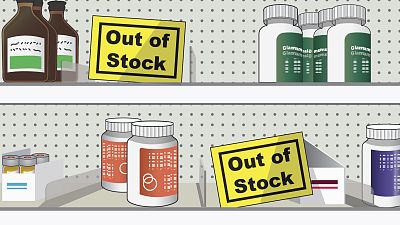Two key legislative frameworks aimed at reducing dependencies on critical drugs and boosting the EU’s life science sector were included in the political guidelines of newly re-elected Commission President Ursula von der Leyen.
Two previously touted initiatives, the Critical Medicines Act and the Biotech Act, were clearly marked in the political manifesto outlining the policy priorities of the next EU executive released by Ursula von der Leyen on Thursday (18 July), ahead of her successful confirmation vote.
The Critical Medicines Act will be designed to address severe shortages of medical devices and drugs within the EU, such as antibiotics, insulin, and painkillers. It targets medical products that have become particularly difficult to obtain or are supplied by a limited number of manufacturers or countries.
“This will be part of our work to complete the European Health Union with diversified supply chains, access to the most advanced treatments, more resilient health systems, and strategic inventories of key medicines,” the document stated.
This announcement followed a process initiated last December when the European Medicines Agency (EMA) published a list of critical medicines, identifying over 200 active substances essential for healthcare systems across Europe. This was followed by the launch of the Critical Medicines Alliance in April—a platform for voluntary cooperation aimed at strengthening the supply of critical medicines.
While no concrete timeline has been set for the presentation of this particular policy framework, it will be included in a broader action plan dedicated to enhancing the EU economy’s resilience and reducing dependency, in line with the strategic autonomy principle crucial to the next Commission’s industrial policy.
Biotech Act Expected in 2025
The Biotech Act, also anticipated in a non-binding Biotech initiative launched in March but only confirmed now, aims to simplify regulatory processes for the life science sector.
This legislation, slated for 2025, seeks to “bring biotech from the laboratory to the factory and then onto the market.”
“This will be part of a broader Strategy for European Life Sciences to look at how we can support our green and digital transitions and develop high-value technologies,” the manifesto said.
Von der Leyen believes Europe can capitalise on the upcoming biotech revolution through “biotechnologies, supported by AI and digital tools [that] can help modernise entire parts of our economy, from farming and forestry to energy and health.”
“The dedicated life sciences strategy, which includes plans for a new Biotech Act, is an important part of the wider drive to boost European competitiveness over the next five years,” commented Nathalie Moll, director general of the EU’s pharmaceutical lobby EFPIA.
“Biotechnology is rightfully recognized by President von der Leyen as central to Europe’s future,” echoed Claire Skentelbery from the EU biotech association EuropaBio.















